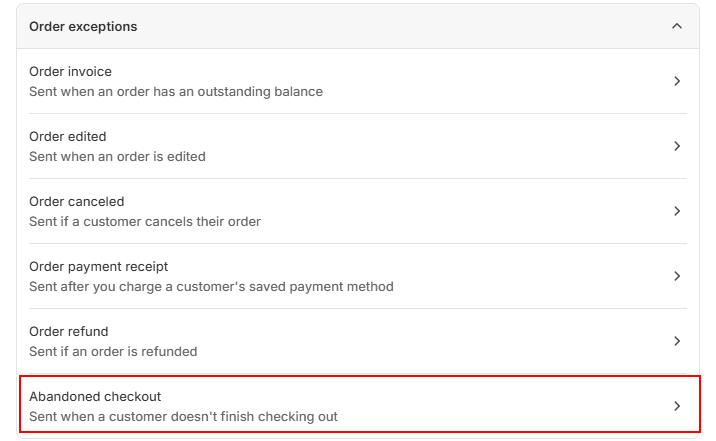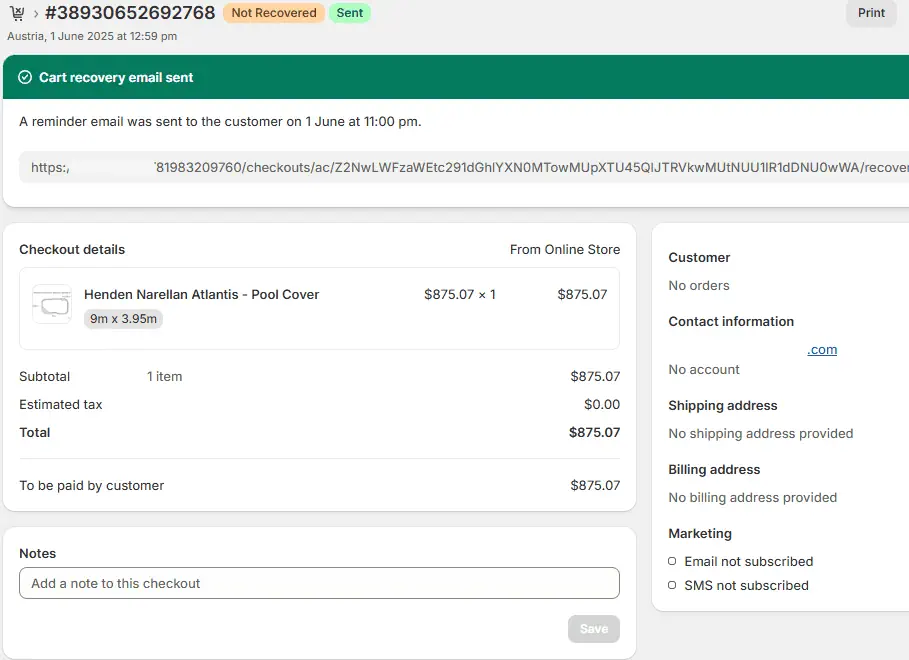What is Shopify Cart Abandonment?
Cart abandonment happens when a customer adds products to their cart but exits before completing the checkout process.
On Shopify, this event is automatically tracked. If the customer has entered their email, Shopify logs their cart details and gives you tools to follow up. That means you’re not starting from scratch — you have a warm lead and a clear path back to conversion.
💡 Pro tip: Think of cart abandoners as “almost-buyers”. They didn’t bounce on the homepage — they wanted your product. They just hit a roadblock.
Why Do Customers Abandon Their Carts?
Before you fix abandonment, you have to understand it. Even the best abandoned cart emails won’t help if people can’t check out or run into other issues. Here are the top reasons customers leave at the finish line:
Unexpected costs – surprise shipping fees or taxes.
Nearly 48% of shoppers abandon their cart when surprised by fees like shipping, taxes, or duties. (EMARKETER)
Long or clunky checkout – too many steps, mandatory account creation.
Around 17–22% abandon due to long forms, multi-step flows, or confusing checkout UX, especially on mobile. (Hotjar)
No preferred payment method – Google Pay and Apple Pay are essential on mobile!
13% of shoppers quit if they don’t see familiar options like Apple Pay, Google Pay, or Buy Now Pay Later (BNPL). (PayPal)
Security concerns – no trust badges, missing reviews.
Between 19–25% abandon because the site looks insecure, missing SSL badges, unclear policies, or no reviews. (Shopify)
High or slow shipping – delivery delays or expensive shipping options.
Long delivery times or high shipping costs turn off 23–24% of shoppers.
Poor mobile UX – hard-to-click buttons, slow load times.
Poor site performance (including mobile bugs or JS errors) contributes to 14–17% abandonment.
No clear returns or reviews – customers fear they can’t get support if needed.
About 13% will abandon if they can’t find return info, guarantees, or customer reviews. (SellersCommerce)
Each of these can be solved, but not all at once. Identify your biggest friction points and address them one by one.
Shopify Abandonment Benchmarks: How Do You Compare?
Average Shopify abandonment rate: 65–75% (Baymard Institute)
Fashion stores: Often 75–80% (size, style, comparison shopping) (Statista)
Electronics/Home goods: Closer to 60–70%
Mobile users: Up to 85% abandonment rate (Barilliance)
These numbers might sound scary, but they also show how much untapped revenue is on the table. Fixing even a small part of the checkout experience can have a huge impact.
The Business Impact: It’s Bigger Than You Think
Let’s say your store makes $10,000/month in revenue with a 70% abandonment rate. That’s $20,000–30,000/month in potential sales sitting in abandoned carts.
Even recovering just 15% of those could add $3,000–4,500 in monthly revenue.
And that’s just the beginning. Customers who complete a purchase are more likely to:
Become repeat buyers
Join your email list
Refer others
Increase customer lifetime value (CLV)
How to Recover Abandoned Carts in Shopify
Shopify automatically tracks cart abandonments and includes built-in recovery emails. But sending one generic email isn’t enough.
To recover carts effectively, you need:
Speed (first message within 1–2 hours)
Multiple touchpoints (email, SMS, retargeting)
Compelling messaging (not just “hey, you left something…”)

Why Most Abandoned Cart Emails Don’t Work (And How to Fix Them)
Let’s be blunt: most recovery emails get ignored because they’re boring.
Generic subject lines (“You forgot something”) = instant archive
No urgency or reason to come back
No emotion, no trust, no personalisation
Fix it by:
A/B testing subject lines with curiosity (“Still deciding?”), urgency (“Your cart is expiring”), or emotional payoff (“Your perfect match is waiting”)
Adding social proof: “Over 1,000 people bought this last month”
Using personalised images, product names, and behaviour-based triggers
How to Set Up Abandoned Cart Email in Shopify
To enable built-in emails:Go to Settings → Notifications → Abandoned Checkout Email.

But don’t stop there. Improve performance by:
Customising the template with your brand voice
Including product images, pricing, and an obvious CTA
Sending a sequence: 1 hour, 24 hours, and 72 hours
How to Reduce Abandoned Carts in Shopify: 9 Proven Strategies
1. Simplify Checkout
Use a single-page checkout, autofill, and progress indicators. Every extra field reduces conversions.
2. Offer Guest Checkout
Don't force account creation. Let new customers checkout fast — and offer to save details afterward.
3. Be Transparent About Shipping
Show costs early. Use a shipping calculator or threshold (e.g., “Free shipping over $50”) to build trust.
4. Use Exit-Intent Popups
Trigger targeted popups with shipping FAQs, a discount, or testimonials just as users start to leave.
5. Add Trust Badges + Reviews
Security icons, money-back guarantees, and real reviews can overcome buyer hesitation.
6. Offer More Payment Options
Support credit/debit, PayPal, Apple Pay, Google Pay, and BNPL tools like Klarna or Afterpay.
7. Send Smart Abandoned Cart Emails
Don’t just “remind” — reassure, incentivise, and personalise. Include product images, urgency, and value.
8. Personalise the Experience
Use names, cart items, and dynamic recommendations to make customers feel seen.
9. Retarget with Facebook/Google Ads
Abandoners see your products again across the web, reinforcing familiarity and nudging them to finish the purchase.
Best Apps for Shopify Cart Recovery (By Channel)
| App | Channel(s) | Best For |
|---|---|---|
| Klaviyo | Email/SMS | Advanced segmentation, flows, analytics |
| Omnisend | Email/SMS | Prebuilt workflows, great for mid-size stores |
| Privy | Popups + email | Exit popups + basic email recover |
| Recart | SMS/Facebook | Messenger & SMS automation |
| PushOwl | Web Push | Push notifications without emails |
| CartHook | Post-checkout | Funnels, upsells, recovery after checkout |
💡Pro tip: Mix channels. Email for detail. SMS for urgency. Push for reach. Retargeting for visibility.
What a $1M+ Shopify Store Does Differently
Sends multi-channel cart recovery: email, SMS, push, retargeting.
Segments users: VIPs vs. first-timers get different messages.
Uses heatmaps and screen recordings (Hotjar, Lucky Orange) to find UX issues.
Personalises recovery flows based on cart value or product type.
Doesn’t discount every cart — they test incentives based on intent.

Turning Abandoned Carts into Loyal Customers
Abandonment happens, but it doesn’t have to mean lost revenue.
By understanding customer intent, fixing friction points, and following up with smart, timely messages, you can recover a serious chunk of lost sales — and build long-term relationships in the process.
This isn’t just about recovering $50 orders. It’s about transforming a missed conversion into a loyal repeat customer.
Shopify Abandoned Cart FAQ
How to check abandoned carts on Shopify?
Go to Shopify Admin → Orders → Abandoned checkouts. You’ll see a list of incomplete orders, including customer details (if available), products, and timestamps.

How to customize Shopify abandoned cart email?
Under Notifications → Abandoned checkout, click “Edit code” or “Edit email template”. You can change the layout, wording, branding, and buttons to match your store’s style. For advanced customisation (like segmentation or A/B testing), use apps like Klaviyo or Omnisend.
How to add image to abandoned cart email in Shopify?
If you’re using Shopify’s default email, it auto-inserts product images from the cart. To add custom images (like banners or badges), edit the email’s HTML directly, or switch to a visual editor like Omnisend or Klaviyo.
How to resend abandoned cart email in Shopify?
Shopify does not allow you to manually resend the same cart recovery email unless the cart is re-created. However, some third-party apps (like Klaviyo) let you trigger a resend if a customer doesn’t convert after the first attempt.
How to turn off Shopify abandoned cart email?
Go to Settings → Notifications → Abandoned checkout and disable the toggle. Be sure to turn this off if you're switching to an external tool (like Klaviyo), so customers don’t receive duplicate emails.




